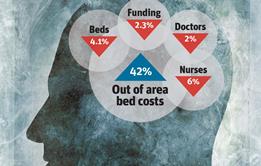HSJ’s findings of sustained real terms cuts for mental health providers demonstrates why the health service needs more than just financial aid. Even during times of plenty, mental health spending growth has struggled to keep pace
The clamour in the NHS for additional funding has a growing sense of urgency, to which HSJ’s finding of sustained real terms cuts for mental health providers will add.
One symptom of the current atmosphere is that even when political leaders settle on reforms that would normally be regarded as sensible, they are rebuffed rather than embraced.
For example, Jeremy Hunt’s current obsession with patient safety, a focus many NHS leaders have in the past advocated, is widely seen as flawed because it fails to solve the money issue.
- Analysis reveals mental health trust funding cuts
- Revealed: The mental health trusts with the biggest income cuts
- Mental health patients sent hundreds of miles for a bed
- Edwards: The squeeze is on for mental health trusts
- Sign up to the mental health newsletter
Time for big spending?
Last week Labour’s shadow care minister Liz Kendall gave a speech advocating joining up health and social care, prevention, personalisation and self-management. Four years ago, a minister offering these policies instead of complex organisational change would have had their hand bitten off.
Yet she was knocked back because her proposals will not solve the funding crisis the NHS will soon face.
‘Four years ago, offering policies instead of organisational change would have been knocked back’
Labour’s new slogan - “big reform not big spending” - will jar on those in public services who have attempted the former for years and are now convinced it is time for the latter.
On one hand, our research will add to the strength of feeling about funding. It gives a comprehensive picture of trends in the mental health sector, overcoming the absence of official national information, and shows the total income of NHS mental health providers has fallen in real terms for three years. This, according to those running them, has necessitated cuts to workforce and beds despite demand pressure.
Fuelling the fear
The work confirms patients in crisis with mental health problems are increasingly being transported away from their home area for an inpatient bed. This will fuel fears that, with NHS funding failing to meet demand, the most vulnerable will be the first to see standards decline.
But the findings also demonstrate why the health service needs more than just financial aid.
‘Even in times of plenty, mental health spending growth has struggled to keep pace’
Total NHS spending increased in 2013-14 more than any other year this parliament, yet mental health has still lost out. Even during times of plenty, mental health spending growth has struggled to keep pace.
To shift the pattern for this and other commonly neglected areas, commissioners would have to be bolstered and empowered to fund what they often know is right.
Policymakers would have to push through changes to performance and funding rules that would irk many influential groups and figures. Both would need strong support from politicians willing to take the risk.
Debate is welcome
Properly addressing demand for urgent mental health admissions - as with other crisis services - would require politicians going even further. They would have to consistently prioritise early intervention, prevention and recovery, and more carefully consider the health impact of their decisions about tax, housing and welfare.
Party leaders could well choose, over the next few months, to engage in a public, high profile debate about the future of the NHS and paying for it. Labour in particular might rather confront the issue now than see an unanticipated crisis unfold on its watch, if the party forms a government.
‘Politicians need to consistently prioritise early intervention, prevention and recovery to address demand’
This debate would be welcome, and may anyway be forced when NHS England chief executive Simon Stevens sets out the service’s medium term prospects in the autumn. But it is hardly likely to lead overnight to a promise of the billions of pounds the service would need to solve its problems. Such a debate, and any new money, will come with the demand for specific reform, not obviate the need for it.
In anticipation of this, as well as highlighting the imminent funding shortfall, the service needs to give thought to which trade-offs would be the most constructive and encourage them, while trying to stave off those that would be most damaging.
Exclusive: Analysis reveals mental health trust funding cuts

NHS mental health providers have slashed beds and staff levels as they cope with real term funding cuts and the soaring cost of sending patients hundreds of miles away for treatment.
- 1
- 2
- 3
 Currently
reading
Currently
reading
Seek funding but also encourage constructive reform
- 5

































1 Readers' comment